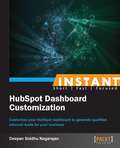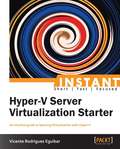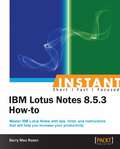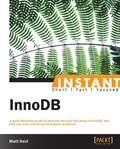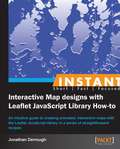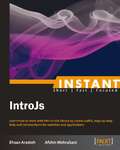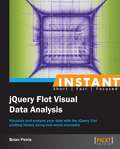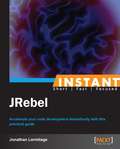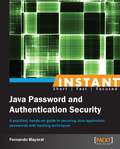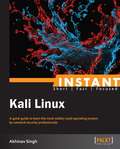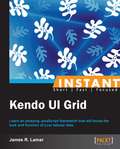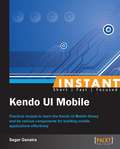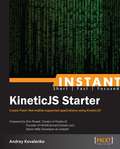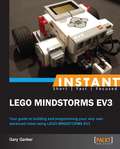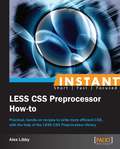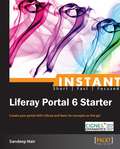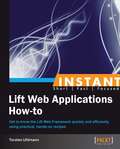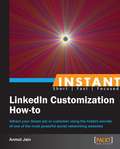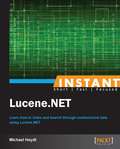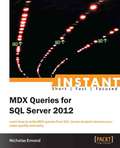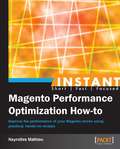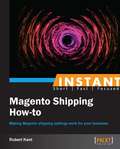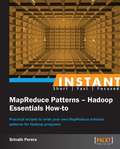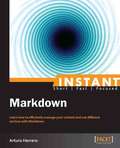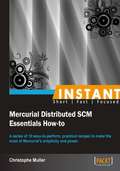- Table View
- List View
Instant HubSpot Dashboard Customization
by Deepan Siddhu NagarajanFilled with practical, step-by-step instructions and clear explanations for the most important and useful tasks. A headlong guide including example driving situations, clear instructions for important tasks, and details for enhancing your social media management experience. This book is a perfect fit if you are an inbound marketing beginner who feels and believes that handling multiple marketing channels to generate leads is a cumbersome activity. The best part is, you don't need to have coding skills to customize your Hubspot portal when you've got this book. Basic knowledge of computers is essential.
Instant Hyper-V Server Virtualization Starter
by Vicente Rodriguez EguibarGet to grips with a new technology, understand what it is and what it can do for you, and then get to work with the most important features and tasks.The approach would be in a tutorial manner that will guide the users in an orderly manner toward virtualization.This book is conceived for system administrator and advanced PC enthusiasts who want to venture into the virtualization world. Although this book goes from scratch up, knowledge on server Operative Systems, LAN and networking has to be in place. Having a good background on server administration is desirable, including networking services.
Instant IBM Lotus Notes 8.5.3 How-to
by Barry Max RosenGet to grips with a new technology, understand what it is and what it can do for you, and then get to work with the most important features and tasks.A Packt Instant How-to guide, which provides a quick and easy way to get started with IBM Lotus Notes 8.5.3.If you are brand new to Lotus Notes, a seasoned professional, or you are coming from Microsoft Outlook, this book will enable you to work smarter not harder in Lotus Notes 8.5.3.
Instant InnoDB
by Matt ReidGet to grips with a new technology, understand what it is and what it can do for you, and then get to work with the most important features and tasks. This book is a complete reference guide, designed to provide you with answers and solutions to all the common problems you encounter within InnoDB, helping you achieve higher performance and greater stability in your InnoDB databases. The "Instant InnoDB " features content for all skill levels of MySQL administrators, developers, and engineers.
Instant Interactive Map Designs with Leaflet JavaScript Library How-to
by Jonathan DerroughFilled with practical, step-by-step instructions and clear explanations for the most important and useful tasks. This How-to guide offers techniques and skills through recipes. The guide is packed with step-by-step instructions for anyone who wants to learn to design and deploy interactive maps to their applicationThis book is a perfect fit for developers without prior knowledge of other map APIs and wishing to build great maps in no time. Basic knowledge of working with JavaScript and web application development is essential.
Instant IntroJs
by Afshin Mehrabani Ehsan ArastehGet to grips with a new technology, understand what it is and what it can do for you, and then get to work with the most important features and tasks. A simple starter that will guide you through IntroJs from scratch to advanced topics using a simple step by step approach with useful examples along the way.This book is for web designers who want to create an interactive step-by-step introduction for showing specific or all parts of an application or website to users. Basic JavaScript programming and knowledge of HTML and CSS is required. No knowledge of any other JavaScript libraries is needed.
Instant JQuery Flot Visual Data Analysis
by Brian PeirisFilled with practical, step-by-step instructions and clear explanations for the most important and useful tasks. A quick, instruction-based guide full of examples that details on the various aspects of Flot and how users can apply it to data groups for interactive data representation techniques.If you are a data visualization developer, mapping and presentation software developer, or anyone with an interest in jQuery visualization, this book is ideal for you. If you have a working knowledge of jQuery and JavaScript, you can use this book to add sophisticated visualizations to your web application so that your users can easily understand data that is crucial to them.
Instant JRebel
by Jonathan LermitageFilled with practical, step-by-step instructions and clear explanations for the most important and useful tasks. This book is an easy-to-follow guide full of hands-on examples of real-world Java development tasks. Each topic is explained and placed in context, and for the more inquisitive readers, there are more-in-depth details of the concepts used.If you have experience in Java desktop or web application development based on Servlets and you want to update your code instantly without recompiling and redeploying the code, this book is for you.
Instant Java Password and Authentication Security
by Fernando MayoralFilled with practical, step-by-step instructions and clear explanations for the most important and useful tasks. This book takes a hands-on approach to Java-based password hashing and authentication, detailing advanced topics in a recipe format.This book is ideal for developers new to user authentication and password security, and who are looking to get a good grounding in how to implement it in a reliable way. It's assumed that the reader will have some experience in Java already, as well as being familiar with the basic idea behind user authentication.
Instant Kali Linux
by Abhinav SinghGet to grips with a new technology, understand what it is and what it can do for you, and then get to work with the most important features and tasks. A quick and handy guide for those who are willing to get straight into the business. This book will build a strong foundation for those who are willing to cover different security assessment areas by mastering various tools and techniques.If you are a beginners or an experienced security professional who is willing to dive deeper into the world of information security, then this book is perfect for you. The book is written is simple technical language which requires only a basic knowledge of security assessments and the Linux operating system.
Instant Kendo UI Grid
by James R. LamarFilled with practical, step-by-step instructions and clear explanations for the most important and useful tasks. This is a Packt Instant How-to guide, which provides concise and clear recipes for working with tabular data with Kendo Grids.This book is for anyone with some basic HTML, CSS, and JavaScript experience. Intermediate and advanced users will find several helpful examples as well. Whether you are predominantly a designer or a developer, this book will work for you.
Instant Kendo UI Mobile
by Sagar GanatraFilled with practical, step-by-step instructions and clear explanations for the most important and useful tasks. Written as practical recipes, Instant Kendo UI Mobile How-to will show you all you need to know to build your first mobile application utilizing the Kendo UI Mobile framework and its components.This book is for web application developers who are looking forward to build a mobile website or an application. It requires basic knowledge of HTML, CSS, and JavaScript. This guide assumes that you are new to the topic and provides a step-by-step approach to building mobile applications using the Kendo UI Mobile library.
Instant KineticJS Starter
by Andrey KovalenkoGet to grips with a new technology, understand what it is and what it can do for you, and then get to work with the most important features and tasks.This is a Starter guide that will quickly get you started building HTML5 Canvas applications with KineticJS.Are you a developer looking to get a quick start without going deep into HTML5 Canvas standard? Then this book is for you. It's assumed that you will have some experience in HTML and JavaScript already.
Instant LEGO Mindstorm EV3
by Gary GarberFilled with practical, step-by-step instructions and clear explanations for the most important and useful tasks. A concise guide full of step-by-step recipes to teach you how to build and program an advanced robot."Instant LEGO Mindstorm EV3" is for both the adult tinkerer who has never touched LEGO before and the experienced LEGO engineer who has evolved from Mindstorm NXT to EV3. If you are interested in entering or advising students in robot competitions such as the FIRST LEGO League, the Wold Robot Olympiad, or RoboGames, then this book is a must for you. Even if you haven't purchased your Mindstorm EV3 kit yet, this book will give you a good introduction to the platform.
Instant LESS CSS Preprocessor How-to
by Alex LibbyFilled with practical, step-by-step instructions and clear explanations for the most important and useful tasks. Get the job done and learn as you go. A how-To book with practical recipes accompanied with rich screenshots for easy comprehension.This book takes the How-to series approach to help you learn most important tasks through recipes This book is ideal for those new to using CSS Preprocessors such as LESS, and who are looking to get a good grounding in how to use LESS. It's assumed you will have some experience in using HTML and CSS already; it is likely you will be responsible for maintaining at least one website (the larger the better), and are keen to learn how you can use LESS to help make it easier to manage your CSS styles. Although this book does incorporate some additional code using Modernizr, it is not essential to have had any previous experience with Modernizr.
Instant Liferay Portal 6 Starter
by Sandeep NairGet to grips with a new technology, understand what it is and what it can do for you, and then get to work with the most important features and tasks. A simple Starter approach towards understanding significant areas of portals such as content management, document management, and collaboration. It also provides an overview of Liferay concepts and terminologies.Instant Liferay Portal 6 Starter is great for new users who want to know what Liferay is all about. It will quickly give them an overview about Liferay Portal and its features. It is also good for those who want to analyze whether Liferay is fit for their requirements and are interested in what unique features Liferay can offer.
Instant Lift Web Applications How-to
by Torsten UhlmannFilled with practical, step-by-step instructions and clear explanations for the most important and useful tasks. Get the job done and learn as you go. Packt How-to books follow practical examples to quickly and easily instruct in the use of a toolset. This book is for developers who want to start developing Lift applications and learn about the Lift framework and its amazing capabilities, and for people who want to become comfortable with the Lift toolset so they can quickly get up to speed with Lift and begin developing their first applications. The practical descriptions within the book quickly show the reader whether Lift has the right features for them. This book is for people who have some basic knowledge and understanding of the Scala language.
Instant LinkedIn Customization How-to
by Anmol JainStep-by step application of the features of LinkedIn provides a good grounding in creating effective résumés and optimizing your search. If you're looking for a job, genuinely interested in expanding your lifelong professional network, or simply want to learn about the tips and tricks of LinkedIn, then this is the right book for you.
Instant Lucene.NET
by Michael HeydtFilled with practical, step-by-step instructions and clear explanations for the most important and useful tasks. A step-by-step guide that helps you to index, search, and retrieve unstructured data with the help of Lucene.NET.Instant Lucene.NET How-to is essential for developers new to Lucene and Lucene.NET who are looking to get an immediate foundational understanding of how to use the library in their application. It's assumed you have programming experience in C# already, but not that you have experience with search techniques such as information retrieval theory (although there will be a little of that explained). The recipes in the book generate or come with sample documents, but feel free to use your own!
Instant MDX Queries for SQL Server 2012
by Nicholas EmondGet to grips with a new technology, understand what it is and what it can do for you, and then get to work with the most important features and tasks. This short, focused guide is a great way to get stated with writing MDX queries. New developers can use this book as a reference for how to use functions and the syntax of a query as well as how to use Calculated Members and Named Sets.This book is great for new developers who want to learn the MDX query language from scratch and install SQL Server 2012 with Analysis Services
Instant Magento Performance Optimization How-to
by Nayrolles MathieuFilled with practical, step-by-step instructions and clear explanations for the most important and useful tasks. Get the job done and learn as you go. A how-To book with practical recipes accompanied with rich screenshots for easy comprehension.This a Packt Instant How-to, and provides a quick and easy way to improve your Magento performance with step-by-step instructions for important tasks.This book is written for Magento administrators who are familiar with the backend console but new to anything beyond this, and wish to optimize their store for increasing performance.
Instant Magento Shipping How-To
by Robert KentFilled with practical, step-by-step instructions and clear explanations for the most important and useful tasks. Instant Magento Shipping How-To is a step-by-step guide to learn and understand the different shipping configurations and settings of Magento.This book is perfect for Magento store owners who wish to explore the possibilities of extending their shipping options for both themselves through order processing, and their customers through promotions and multiple shipping methods. It's also great for any store owner wishing to gain a bit more insight into the technical workings of Magento's administration panel.
Instant MapReduce Patterns – Hadoop Essentials How-to
by Srinath PereraFilled with practical, step-by-step instructions and clear explanations for the most important and useful tasks. This is a Packt Instant How-to guide, which provides concise and clear recipes for getting started with Hadoop.This book is for big data enthusiasts and would-be Hadoop programmers. It is also meant for Java programmers who either have not worked with Hadoop at all, or who know Hadoop and MapReduce but are not sure how to deepen their understanding.
Instant Markdown
by Arturo HerreroGet to grips with a new technology, understand what it is and what it can do for you, and then get to work with the most important features and tasks. A quick, clear, concise tutorial guide-based approach that will help you to get started with Markdown.Instant Markdown is for people who are interested in an introduction to Markdown. You will not need any specific knowledge about programming or markup languages. This book will give you many ideas to use and take full potential of Markdown over many different services.
Instant Mercurial Distributed SCM Essentials How-to
by Christophe MullerFilled with practical, step-by-step instructions and clear explanations for the most important and useful tasks. This book has a simplified, recipe-based approach, which shows the essential features of Mercurial SCM for software configuration engineers/programmers using Mercurial or another version control system of a similar kind.Instant Mercurial SCM Essentials How-to is aimed at software developers already familiar with version control but new to the Mercurial open source DVCS, who want to master both the basics and some very advanced features of the tool. You are expected to be familiar at either working with the console in Windows, or the Unix command line in Linux or Mac OS X, as the examples are command-line based.
